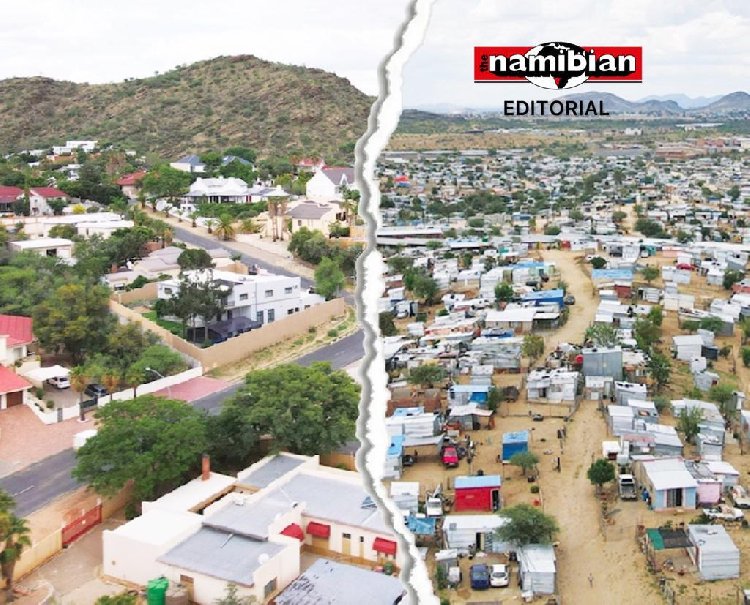www.aljazeerah.info
Opinion Editorials, September 2022
Archives
Mission & Name
Conflict Terminology
Editorials
Gaza Holocaust
Gulf War
Isdood
Islam
News
News Photos
Opinion Editorials
US Foreign Policy (Dr. El-Najjar's Articles)
www.aljazeerah.info
Namibia: Free Money For a Few Leaves Majority Poor By the Editorial Team The Namibian, September 5, 2022 |
 |
|
| Rich and poor in Namibia, September 5, 2022 |
Free Money For a Few Leaves Majority Poor
Opinions - Editorials | 2022-09-04
AS NEGOTIATIONS for Namibia's independence became heated in 1988 and 1989, then Ovaherero paramount chief Kauima Riruako allegedly dismissed Swapo's stubbornness not to accept freedom if Walvis Bay remained under apartheid South Africa's control.
“Ozongombe zetu kazenu omeva womongua. Ete katuri omahundju. o Mbae/Ezorongodo matu tuara pi hapo? Our cattle don't drink salty water. We don't eat fish. Why should we be hung up about Walvis Bay?” Riruako allegedly argued, giving practical context to the issue.
This attribution to Riruako may be a made-up political joke, but it's a telling one as information has emerged about delays in winding down the estate of the chief due to a clash over fishing-quota money.
Anecdotes abound in the fishing industry of people owning fishing rights and quotas with no interest in the business except money.
There's a story of a certain lawyer who found himself in a company awarded rock lobster fishing rights, but had no clue what the creature looked like. As a result, he nearly scuppered a deal to sell off their quota to foreign investors. Similar tales have appeared in the Fishrot saga.
Riruako, like many leaders and politically connected people, received fishing rights from the Swapo-led government purely for patronage purposes.
The Namibian reported last week that the late chief's estate was owed a minimum of N$1,3 million in dividends from a company he co-owned.
The money accumulated during the five-year period following his death in 2014.
In another classic example of public resources being handed to individuals for self-enrichment, The Namibian this week reported on a clash between the Ministry of Mines and Energy and Nuska Technologies (formerly C-Sixty), which was dubiously given a N$200-million contract over five years.
Mines minister Tom Alweendo is now fighting against the automatic renewal of the contract, which will cost taxpayers another N$200 million, supposedly for the valuation of diamonds being forced on the state-owned company Namdia.
Namdia itself was set up under questionable circumstances.
The main argument advanced by then mines minister Obeth Kandjoze and attorney general Sacky Shanghala was that Namdia would test the market to ascertain whether De Beers was doing the country justice when selling Namibia's sought-after gemstones.
The Namibian public has yet to be informed what Namdia has discovered and achieved in the best interest of the population.
Alweendo and Namdia argue that Nuska Technologies, owned by Israeli Doron Cohen, adds no value as the diamonds are already valued by the government and De Beers joint venture (Namibia Diamond Trading Company) as well as state-appointed valuators.
In addition, Namdia has an inhouse sorting and valuation process that has been doing the job of taking the gems to market.
Cohen initially owned C-Sixty together with businessmen John Walenga and Tironen Kauluma, both of whose political connections were viewed as the only reason the company was clandestinely awarded the multimillion-dollar scheme.
Cohen has since pushed Walenga and Kauluma out of the company, ostensibly because he no longer needed their political connections, which opened doors for him in 2016.
These latest stories of government largesse bestowed on a few individuals again highlight the need for government leaders to take steps to end a culture that puts broader society at a disadvantage with public resources going to tenderpreneurs who add no value.
President Hage Geingob should dust off the report of his own high-level panel on the Namibian economy (HLPNE), which recommended an end to the patronage culture of dishing out public resources to a few.
A huge opportunity was missed when acting fisheries minister Albert Kawana gave fishing rights to a chosen few, totalling a couple of thousand individuals, instead of an auction process that would have put money straight into the tax coffers.
Namibian politicians should realise they are robbing voters by giving free money to a few, leaving the majority worse off despite promises to address widespread poverty and inequality.
Free Money For a Few Leaves Majority Poor - The Namibian
***
Share the link of this article with your facebook friends
|
|
|
|
||
|
||||||


